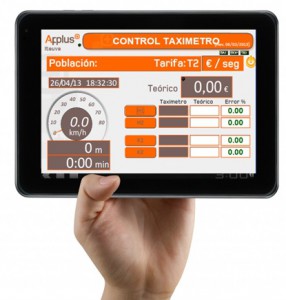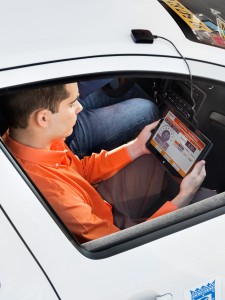GPSi: Universal verification system for taximeters
As legislation continues to evolve, so too do the demands placed upon Applus+. In some cases we find simple solutions, but at other times we must think proactively and innovatively in order to achieve our goals. For example, recent changes regarding the system for measuring braking power, the most important element of our inspections. In response to this change, we carried out extensive research to create our own software that would ensure all inspectors were complying with all legislation without even needing to give it any thought.
 Similarly, the GPSi project began with the aim of developing a universal verification system for taximeters that did not require a speedometer. Some vehicles cannot be tested in the usual way – using roller beds – and alternative testing methods have always been permitted. The roller-bed test is clearly deficient from a metrological point of view, but it was often the only option available. GPSi allows the verification testing of taximeters on any vehicle in real traffic conditions, with high accuracy and under metrological conditions equivalent to testing on rollers.
Similarly, the GPSi project began with the aim of developing a universal verification system for taximeters that did not require a speedometer. Some vehicles cannot be tested in the usual way – using roller beds – and alternative testing methods have always been permitted. The roller-bed test is clearly deficient from a metrological point of view, but it was often the only option available. GPSi allows the verification testing of taximeters on any vehicle in real traffic conditions, with high accuracy and under metrological conditions equivalent to testing on rollers.
Taximeters are subject to legal metrological verification, hence the accuracy of the control method and the traceability of the calibration were always going to be key. From the outset it was clear that the GPS, if used properly, could be accurate enough to be used in taximeter verification, but proving this was our project’s greatest challenge.
The first verification phase, in 2009, was carried out through a series of tests at Applus+ IDIADA. In these tests, GPSi results were compared with those of GPS systems with differential correction and displacement readers based on optical sensors.
 Since no metrological laboratory performed tests on GPS systems, the CEM (Spanish Centre of Metrology) was asked to conduct tests on the equipment to check its accuracy in measuring distances and time. In 2012, this series of tests resulted in the development of a calibrated antenna, which was in turn used to calibrate the equipment Applus+ Iteuve used in their taximeter tests. With the antennas calibrated, a testing-procedure modification proposal was presented to the Generalitat de Catalunya, who accepted it on condition that it passed the ENAC audit, which took place in 2013.
Since no metrological laboratory performed tests on GPS systems, the CEM (Spanish Centre of Metrology) was asked to conduct tests on the equipment to check its accuracy in measuring distances and time. In 2012, this series of tests resulted in the development of a calibrated antenna, which was in turn used to calibrate the equipment Applus+ Iteuve used in their taximeter tests. With the antennas calibrated, a testing-procedure modification proposal was presented to the Generalitat de Catalunya, who accepted it on condition that it passed the ENAC audit, which took place in 2013.
In 2015, LGAI (Applus+ Laboratories) was recognised as an official ENAC laboratory with the capacity to verify distance measurements using GPS. As a result, the system is now licensed and commercially available to third parties, who can sell their equipment with the assurance that it is calibrated by a laboratory with ENAC traceability.
Since our ENAC accreditation in November 2015, several batches of tests have been performed, enabling the commercialisation of a variety of calibrated equipment.